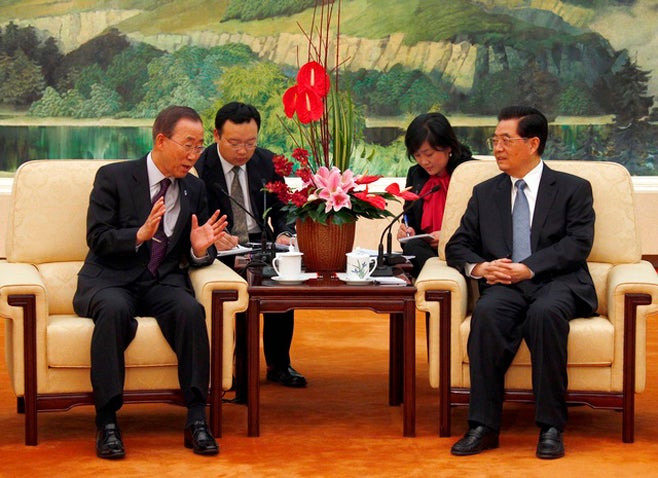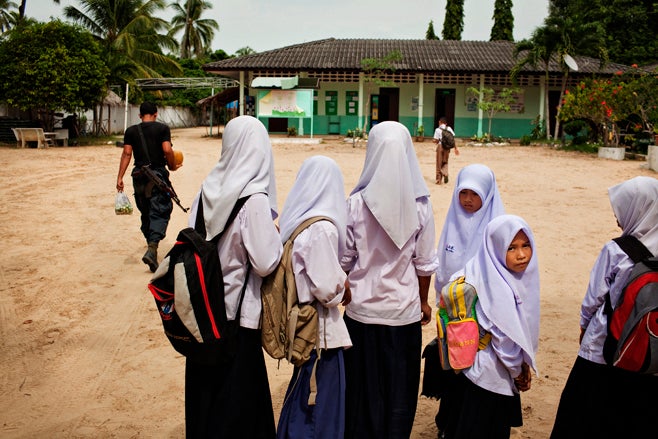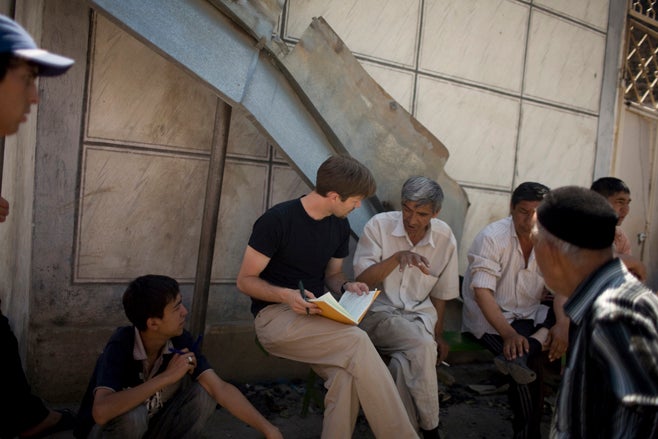The elected government of Prime Minister Sheikh Hasina Wazed made strong commitments to address serious human rights problems in 2010, but those promises were not realized, as extrajudicial executions and torture continued, as well as impunity for members of the security forces. The government mounted sustained attacks on the right to freedom of expression of the media and political opposition. Labor union activists protesting for higher wages were systematically targeted and, in some cases, arrested and jailed on trumped-up charges.
Abuses by the Rapid Action Battalion and Other Forces
Soon after elections in December 2008, officials in the Awami League-led government promised to institute a zero-tolerance policy and bring the perpetrators of extrajudicial killings to justice. Yet little change has taken place, and in 2010 the home minister and other officials denied any wrongdoing by law enforcement agencies, including the Rapid Action Battalion (RAB), the elite anti-crime, anti-terror force whose officers regularly kill with impunity. The RAB acknowledges that its officers have killed at least 622 people since the force was established in 2004. But in press statements, the RAB has claimed that the victims were shot and killed in "crossfire" after their accomplices opened fire on the force. The home minister has also supported the claim that RAB officers who have killed were acting in self-defense. In a worrying development, the police appear to have increasingly adopted the RAB's extrajudicial methods, and several hundred killings have been attributed to the police force in recent years.
Investigations by human rights organizations regularly find that victims were executed while in RAB custody. The bodies of the dead often bear marks of torture, and many survivors of RAB custody have repeatedly alleged ill-treatment and torture. The chairperson of the National Human Rights Commission recommended in December 2009 that all allegations of RAB killings be investigated by an independent commission of inquiry. At this writing the government has taken no action on this, and not a single member of the RAB has been criminally prosecuted for involvement in torture or killings.
In one abortive attempt at justice, the High Court issued a suo moto ruling calling on the government to explain why action should not be taken against the RAB officers responsible for the "crossfire" killing of Lutfar and Khairul Khalashi in November 2009. However, before a ruling could be issued, the relevant judicial bench was reorganized and the case has not since been heard by the court.
Attacks against Civil Society and Media
In July 2010, officials forced the closure of the daily Amar Desh, an opposition-linked newspaper that had reported critically on the government. The editor, Mahmudur Rahman, was arrested under the Anti-Terrorism Act, and he later claimed in court that police officers beat him and that RAB officers blindfolded him, handcuffed him to window bars in a cell, and deprived him of food and water. At this writing the newspaper's closure is under court appeal.
In another assault on free expression, the police in Dhaka, the capital, temporarily shuttered the Drik Picture Library on March 22, shortly before the opening of an exhibit titled "Crossfire" by Shahidul Alam. Police claimed the show, which featured photographs and installations relating to alleged extrajudicial killings by the RAB, would "create anarchy." After a public outcry and a legal challenge by the gallery, the exhibit was finally able to open on March 31.
Harassment and Intimidation of Apparel Industry Workers
In 2010 the government continued to severely restrict the work of trade unionists pressing for an increase in the minimum wage. On June 3 the government's NGO Affairs Bureau suddenly revoked the operating license of the Bangladesh Centre for Workers Solidarity (BCWS), a group with ties to international trade union and labor rights groups and representatives of foreign clothing brands sourcing from Bangladeshi factories.
In July the government raised the monthly minimum wage for garment workers from 1,662 to 3,000 taka (US$24 to $43). Workers contended that the increase was inadequate to meet the rising urban cost of living. On July 30 and 31, as they have often done in the past, angry garment workers took to Bangladesh's streets. They blocked roads and damaged factories and other property. Government security forces responded with force, injuring scores of protesters.
On July 30 the government accused Kalpona Akhter, Babul Akhter, and Aminul Islam, the directors of the BCWS, of inciting workers to protest, which the directors denied. Babul Akhter later alleged that on the night of August 28, he was beaten in custody. Kalpona and Babul Akhter were released on bail in September and are awaiting trial at this writing. Islam, who had managed to escape police custody after being detained and allegedly physically abused by the police in June, remains in hiding.
Impunity
In 2010, members of the security forces regularly escaped accountability for killings, acts of torture, and illegal detentions. Several legal provisions effectively shield members of the security forces and other public officials from prosecution by requiring government approval for criminal actions to be initiated.
Military and police regularly employ torture and cruel, inhuman, or degrading punishment against detainees, despite constitutional guarantees against torture and Bangladesh's ratification of the United Nations Convention against Torture and Other Cruel, Inhuman or Degrading Treatment or Punishment. The government failed to investigate the causes of numerous deaths in custody, and there was little action to hold accountable those responsible for the deaths of alleged mutineers from the Bangladesh Rifles border force.
In 2009 the parliament passed amendments to the International Crimes (Tribunals) Act of 1973 in order to bring to trial those responsible for human rights crimes in the war of 1971, but the law still falls short of international standards. Five members of Jamaat-e-Islami, a religious right-wing political group alleged to have collaborated with Pakistani forces, were in 2010 charged with war crimes, including genocide, and at this writing are awaiting trial before a special war crimes tribunal established in March to investigate crimes committed during Bangladesh's battle for independence four decades ago.
Women's and Girls' Rights
Discrimination against women remains common in both the public and private spheres, despite the presence of women in several key government positions. Bangladesh maintains a reservation against article 2 of the Convention on the Elimination of All Forms of Discrimination against Women, which requires it to effectively adopt laws and policies to provide equal rights for women and men.
Domestic violence is a daily reality for many women, and there was no progress made in adopting laws on domestic violence and sexual harassment during 2010. The Acid Survivors Foundation reported 86 acid attacks, primarily against women, between January and September. The courts convicted only 15 perpetrators of acid attacks in 2009.
Sexual Orientation and Gender Identity
Section 377 of Bangladesh's criminal code punishes consensual homosexual conduct with penalties up to life imprisonment.
Border Killings
According to Odhikar, a Bangladesh human rights monitoring group, at least 930 Bangladeshi nationals were killed by India's Border Security Force between the year 2000 and September of 2010. A number of Indian nationals have also been killed by Indian forces deployed at the border.
Acute poverty and unemployment prompts millions of Bangladeshi nationals to cross the border into India in search of jobs and commerce. While some of those killed are engaged in smuggling goods and contraband, Indian border forces systematically use lethal force without justification.Bangladeshi authorities have repeatedly complained about killings of Bangladeshis, as have human rights groups in both countries. Bangladeshi Home Minister Sahara Khatun in May 2010 said that she would again ask officials in New Delhi, India's capital, to stop these incidents. Indian authorities declared that their forces have been instructed to exercise restraint, but there was little sign of progress in ending violations during 2010.
Discrimination in Corruption Cases
Prime Minister Sheikh Hasina and her Awami League party reiterated the government's strong commitment to address the problem of corruption in 2010. Yet the government recommended that the courts and the Anti-Corruption Commission withdraw hundreds of corruption cases initiated against Awami League supporters on the grounds that they were "politically motivated" cases filed under previous governments. The government has not recommended similar cases against the political opposition for withdrawal, raising significant concerns about discriminatory treatment and politically motivated prosecutions.
Refugees
Bangladeshi authorities did little to prevent a wave of intensifying violence and discrimination against Rohingya refugees from Burma, and refugees were driven out of communities and into makeshift camps. Newly arriving Rohingya were systematically denied the right to seek asylum in 2010.
Key International Actors
Foreign governments-including the US and members of the European Union-raised concerns about extrajudicial executions, stressed the importance of addressing impunity, and called for respect for human rights, but also continued to view the RAB as an important anti-terrorism force. The US has provided training on investigation methods and human rights to the RAB, but has failed to vigorously enforce the Leahy Law and deny US assistance and training to all RAB units credibly implicated in human rights abuses where justice has not been done.
After the arrests of key labor leaders in the garment industry, the US Congress sent a letter in August to US garment importers urging them to put economic pressure on Bangladesh to secure the release of the prisoners. The US Congress also called for action to withhold Generalized System of Preferences trade benefits for Bangladesh on labor rights grounds.



